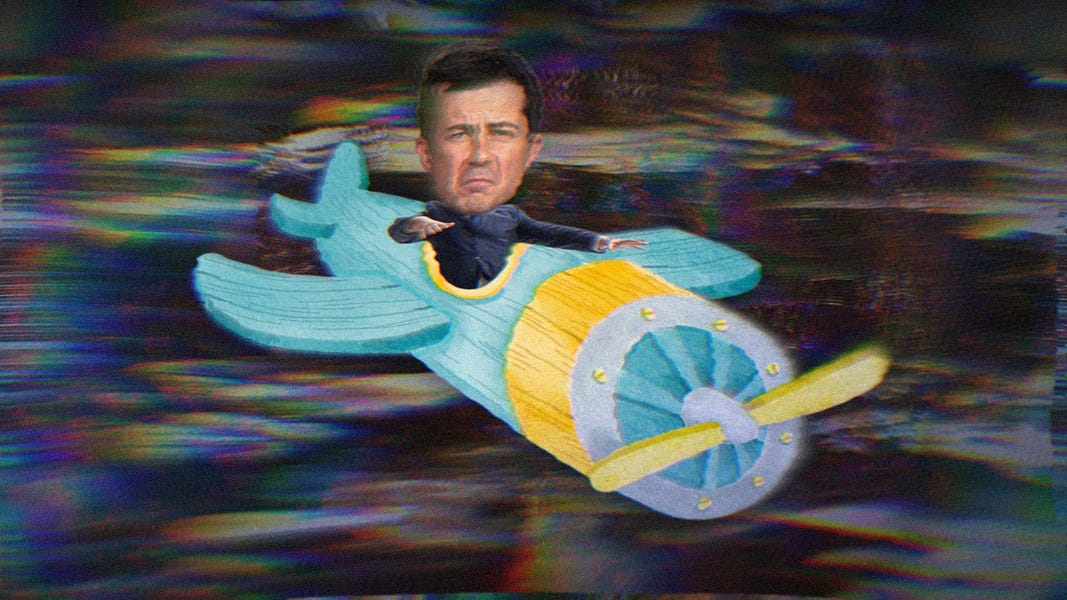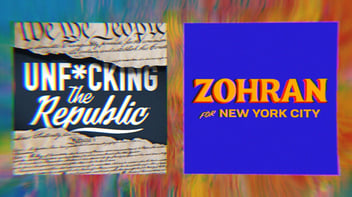Airline Crisis: Why Is the FAA Failing Under Buttigieg?
 Image Description: Pete Buttigieg sitting in a cartoon airplane, frowning.
Image Description: Pete Buttigieg sitting in a cartoon airplane, frowning.
Betcha a nickel that Petey Buttaloohoo is probably going to run for President again.
As progressives, I think it’s important to get on board the fuck-this-guy train early. When Mayor Pete of South Bend, Indiana hit the national stage in his bid for president, there was a good amount of energy in the initial stages among white Democrats. Ultimately, he scored a literal zero rating of support from black voters and failed to find his footing as the primaries wore on. But he firmly implanted himself in the national consciousness and put himself in a prime spoils position on the Biden team of rivals.
Progressives smoked out Mayor Pete pretty early. Despite a profoundly liberal upbringing, personal fealty to the Bernie wing of the party and campaigning as an openly gay politician, Pete’s resume went from left wing prospect to corporate cut out pretty quickly. A stint in the military, a couple years at McKinsey, a failed statewide campaign, and eventually Pete settled into the role of Mayor Pete and shed his progressive baggage every step of the way.
Now serving as Transportation Secretary, Buttigieg is still struggling to manage expectations in what has been a chaotic tenure, to say the least. He failed to support striking rail workers, has been unable to bring the airline industry to heel and has the daunting task ahead of trying to navigate hundreds of billions of dollars in disbursements into the nation’s transportation system and infrastructure. His incredible lack of imagination is matched only by his extreme personal confidence and ability to act as though everything is just hunky dory. But it’s not hunky fucking dory.
Looking at his career, it’s astounding how much confidence he possesses in himself, despite having little vision or ideology. When he ended his primary bid, he even bemoaned the end of his cause, even though he never really stood for anything except the middle ground.
Progressives took note as Mayor Pete led the charge during the debates to go after Bernie Sanders, in particular. Of course, on stage he ran into the human buzzsaw that is Bernie, who made sure to note that the Sanders campaign was standing firm against Pete’s billionaire donors.
Undaunted after dropping out, Buttigieg went on the offensive against his former hero and lambasted Bernie and the progressives in every interview in an effort to curry favor with the Biden team with the other candidates dropping out and following suit. Whether Biden runs again is a big mystery and a huge question right now, as it’s clear the President is, how shall I put this, not exactly sharp as a tack at this point.
What should be concerning is how Mayor Pete has managed to maintain such a high profile in an otherwise inconspicuous and technocratic job. It means one of two things. Either he’s a media darling and the Democratic establishment is dead set on keeping him in the public eye to normalize him to national audiences, or he’s really shitty at his job. My fear is that it’s both.
I mean, seriously. Can you name a former transportation secretary? I couldn’t, so I went back to look at the list of them and realized that the position has always been filled by either no name technocrats like Ray LaHood or Rodney Slater or patronage leeches like Elizabeth Dole or Elaine Chao. Lizzy Dole was Senator Bob Dole’s wife and Chao is Turtleface Mitch’s wife. Lizzy Dole at least had some political experience and went on to accomplish a good deal more. Chao is just a corporate monster who has worked at evil think tanks and corporations literally her entire career. But Pete?
Like I said, my fear is that he’s both.
When you’re bad at your job and still want a promotion.
So let’s take a look at the “shitty at his job” angle and talk about what the fuck is going on with air travel these days.
Traveling by air in the United States can be a stressful, expensive and rage-inducing experience. To make matters worse, the agency ostensibly in charge of overseeing this powerful and well-connected industry has abdicated its duties and, as a result, left the American consumer to fend for themselves. Keep this in mind as we proceed: Transportation Secretary Pete Buttigieg fined only six air carriers over refunds in 2022—five foreign firms and only a single domestic airline, Frontier, which lacks influence in Washington.
While cancellations were up across the board last year, some of the worst days for air travel came on those that are historically the busiest at airports. Recall the period between Father’s Day and July 4 last year when thousands of combined flights were either delayed or canceled. The 2022 holiday season brought yet another meltdown. One of the worst villains in this fiasco is Southwest Airlines, which scratched 71 percent of its flights the day after Christmas, mostly due to incompetence and greed.
$54 billion in Covid bailout funds for the airlines well spent!
In true capitalist fashion, the airlines placed blame on inclement weather, a labor shortage (that it created) and the Federal Aviation Administration, which didn’t do itself any favors after spawning a country-wide outage a few weeks later. The Southwest debacle was especially egregious. The carrier, which reported gross profits of nearly $6 billion over a 12-month period ending in September, failed to invest in modernizing its outdated staffing system—but, of course, it was the first prominent airline to reinstate quarterly dividends after a Covid-bailout ban on corporate payouts ended in the fall.
More on that in a minute.
That announcement came just weeks before the airline left desperate travelers in the lurch. So, instead of investing its profits back into their business to upgrade operations and make travel less hellish for consumers amid historic industry turbulence, the aviation overlords at Southworst decided to spread the wealth to shareholders instead.
Not to be outdone, an FAA system outage on January 10th forced the grounding of all domestic flights in the U.S. for the first time since 9/11 and left Pete Buttigieg reeling for the third time in his tenure. Huh. How a former mayor of South Bend, Indiana couldn’t anticipate such problems is anybody’s guess. Long catching the ire of union groups and progressives for his role in the averted railroad strike that ended in a corporate-friendly deal, the good Mayor Pete has been under considerable pressure to take enforcement action against air carriers.
Instead, Buttigieg has issued thinly veiled threats to airline executives that have fallen as flat as his failed presidential bid, which seemed to have been engineered in a DNC lab, workshopped at McKinsey, and elevated by the corporate media.
To be sure, the nightmare we’re currently facing has been decades in the making. Not only was the American political system instrumental in building the airline oligopoly that has crippled air travel today, but it continues to enable a financial scheme that prioritizes milking consumers for every dime possible, through increased ticket prices (that far outpaced inflation last year) and outrageous ancillary fees for baggages and other presumed luxuries, like leg space! At the same time, airlines are effectively spitting in the face of Americans, and Buttigieg in particular, by failing to refund consumers in cash, as is legally required by law.
With little to no regulatory pressure, they’re literally laughing all the way to the bank.
Carter the Deregulator
So how did we get here? We have to tell you a story about Jimmy the peanut farmer. The Democratic 39th president of the United States ushered in a deregulatory frenzy that surrendered power to corporate interests across the transportation sector, starting with aviation.
The decisive blow came in 1978 when Congress passed the Airline Deregulation Act, which ended federal government control over airlines and abolished the Civil Aeronautics Board, which was responsible for regulating the industry for nearly 50 years and ensured that airlines served rural communities.
From 1939 to 1985, the board controlled nearly every aspect of aviation, including fares, schedules, routes and overseeing airline competition. In its place came the FAA and National Transportation Safety Board—neither of which has the regulatory ability to prevent industry abuses.
As with anything, the law was complicated. Some credit it for allowing “low-cost carriers” to enter the market and giving rise to companies like JetBlue and Southwest. That led to a period of cheaper fares, which meant more Americans were able to experience travel. It also meant that the carriers themselves were essentially able to set the rules.
In 1990, the Economic Policy Institute released a report analyzing deregulation’s impact a decade later and found that “concentration of national and regional market power” had increased; routes became more “circuitous;” service declined; and labor management relations deteriorated—we can also thank Reagan for that last part.
Here’s a key paragraph from the report:
“It would be a mistake, for instance, to take the experience of the early years of airline deregulation—when low, simply structured fares and dramatic competition from new entrants seemed to justify the wildest claims of its proponents—as a model of the benefits that deregulation can bring generally. These short-term gains were followed by medium and, arguably, long-term pain.”
Alright, back to the present day.
A slap on the wrists of airlines is a slap in the face of consumers.
As pandemic restrictions loosened and more people became comfortable with venturing out, demand for travel surged, catching the airlines by surprise. When the world was at a standstill, the airlines viewed the pandemic as a major threat and lobbied hard for a government bailout. All told, the airline industry received $54 billion in assistance, with much of it intended to keep staffing in place. Since they couldn’t formally layoff workers, the industry encouraged thousands of pilots and other critical staff (39,000 in the case of American Airlines) to accept voluntary leave, have their hours cut, or take early retirement—despite being funneled taxpayer money to sustain payroll.
When the CARES Act payroll relief program expired in October 2020, companies immediately began notifying workers of furloughs, and the industry ended the year with 90,000 fewer employees than it started with.
Meanwhile, airline executives’ eyes lit up, and they tried to book as many flights as possible without knowing whether they’d even have the staff to accommodate those routes. And now we know: They didn’t. At the time, though, consumers were none the wiser. You went online, saw an available flight, and booked it. Buttigieg’s DOT received 5,079 consumer complaints in April 2022 alone, which was up 321 percent from three years earlier.
As the journalist Matt Stoller has noted, feeble regulation was the main reason why summer travel sucked. While the regulatory regime has long been gutted, Buttigieg does have authority to fine air carriers. One of the easiest solutions would be to slap large fines on them for offering credits to customers instead of cash, which is legally required. While enforcement orders have declined since the Obama years, such actions have fallen sharply under Mayor Pete’s watch.
As Stoller writes: “He’s just not regulating the industry, and it shows.”
Buttigieg, for his part, claims the DOT is holding airlines accountable for their disastrous performance.
So here we are. There were plenty of signs that 2022 was going to be a disaster for American fliers. A bipartisan group of attorneys general wrote a letter last year to Congressional leaders calling for action because they have no legal authority themselves to sue airlines on behalf of consumers. They also lamented that they had relayed complaints to the DOT, but the agency failed to respond or provide appropriate recourse. The FAA fiasco has also rekindled calls from conservatives to privatize air traffic control, which never materialized under Trump. I don’t know about you, but I don’t want a bunch of for-profit entities in charge of routing flights.
As we stand, there’s no telling whether 2023 will be an improvement from 2022. And Buttigieg has yet to display any real leadership as air travel has turned into the wild west.
So, please remember this moment, when names start to circulate for the next presidential election or the one after that. Or the one after that. Bad enough this guy led the charge to gut Bernie’s primary campaign in 2020. The last thing progressives need is this shapeshifting mealy-mouthed corporate McKinsey bot smooth talking his way into the Oval Office.
Here endeth the cream.
Max is a political commentator and essayist who focuses on the intersection of American socioeconomic theory and politics in the modern era. He is the publisher of UNFTR Media and host of the popular Unf*cking the Republic® podcast and YouTube channel. Prior to founding UNFTR, Max spent fifteen years as a publisher and columnist in the alternative newsweekly industry and a decade in terrestrial radio. Max is also a regular contributor to the MeidasTouch Network where he covers the U.S. economy.


